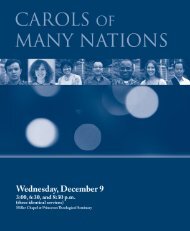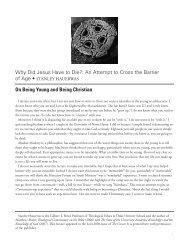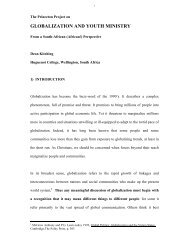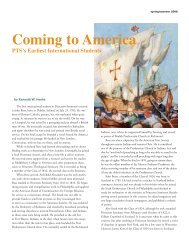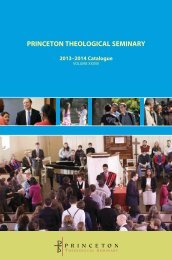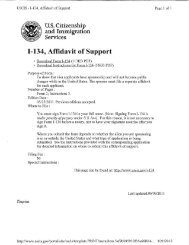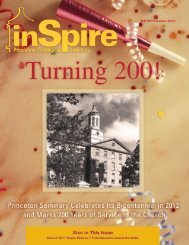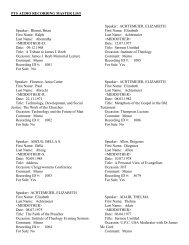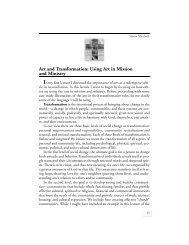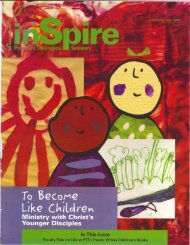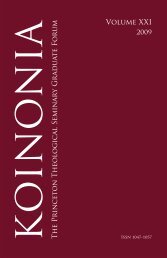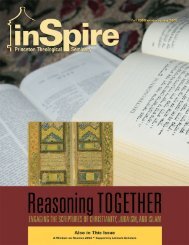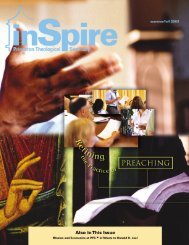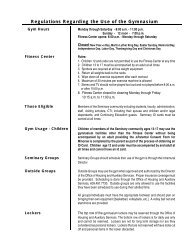P E R S P E C T I VAS - Princeton Theological Seminary
P E R S P E C T I VAS - Princeton Theological Seminary
P E R S P E C T I VAS - Princeton Theological Seminary
Create successful ePaper yourself
Turn your PDF publications into a flip-book with our unique Google optimized e-Paper software.
Perspectivas/Occasional Papers • Fall 2006Perspectivas/Occasional Papers • Fall 2006million modest workers eager to find a second chance within itsborders as enemies. The nation that emerged victorious from theSecond World War to spread the advantages and disadvantages ofmarket capitalism throughout the world now wishes to see immigrants,the very embodiment of individualism and self-reliance,crushed and ousted. Those contradictions would be risible werethey not tragic. To espouse exclusion over inclusion is as immoralas it is self-defeating. The assault against illegal immigrants is notonly an attack against persons and families but also an affront toknowledge.It has become fashionable to argue that Americans are notplagued by a spirit of xenophobia; that they are not against immigrationbut only against those who break the law; that all theyseek is to protect national sovereignty. Outsiders, so the argumentgoes, should wait for their turn to enter the U.S. in an orderly fashionand in accordance with established procedures. To do otherwiseis to make a selfish choice in detriment of those who play bythe rules. That kind of reasoning assumes that all people face thesame options. Yet the workers who cross borders without papersare making the only reasonable choice available to them: to surviveand endure despite the barriers created by outdated and ineffectivelaws. By accident of birth their alternatives are limited.It is part of our Judeo-Christian tradition to recognize one fundamentaltruth—that the law cannot be above justice. Americahas always derived strength from those with the courage andimagination to change or defy bad legislation in the interest of fairplay. From the pilgrim settlers who yearned for religious freedomto those who made possible the American Civil Rights Movement,little social progress has been made in this country without breakinginjurious rules. Those who sanctimoniously advocate respectfor the law might have, in a different era, supported segregationistnorms even as Harriet Tubman worked in the shadows to freeslaves along the Underground Railroad.20Can God be on the side of those who uphold the law at theexpense of humanity? No, is the resounding answer heardthroughout the Old and New Testaments—God is always on theside of the suffering. Thus, the study of immigration presentsmore than an opportunity to fulfill academic objectives; it is also aplatform to achieve what sociologist Marvin Bressler (1964) callsencoded decency. A systematic investigation of the facts surroundingimmigration can lead to better understanding but alsoto the establishment of more sensible and humane approachesthan those currently in existence.Finally, a few more words are necessary about the unintendedconsequences of misguided immigration policies. Those laws arecertain not to curtail the flow of people seeking alternatives in theU.S. but they may achieve a different and unexpected outcome—the creation of a hostile climate in which the children of oncehopeful immigrants will scoff at the purported merits of democracy,opportunity, and fair treatment. Whether legal or not, immigrantsare here to stay. The only doubt is whether they will end upas citizens, or whether they will enlarge the looming and desperateAmerican underclass.BIBLIOGRAPHYAlba, Richard and Victor Nee. Remaking the American Mainstream: Assimilation andContemporary Immigration. Cambridge: Harvard University Press, 2005.Bressler, Marvin. “In Defense of Reason: Some Recent Perspectives.” In Education inthe New America (S. T. Kimball, J. E. McClellan, Jr., editors). New York: John Wiley,1964.Duina, Francesco. The Social Construction of Free Trade: The European Union, NAFTA, andMercosur. <strong>Princeton</strong>: <strong>Princeton</strong> University Press, 2006.Fernández-Kelly, Patricia. For We are Sold, I and My People: Women and Industry inMexico’s Frontier. Albany: State University of New York Press, 1983.Gamio, Miguel. Mexican Migration to the United States: A Study of Human Migration andAdjustment. New York: Dover Publishers, 1971.21



